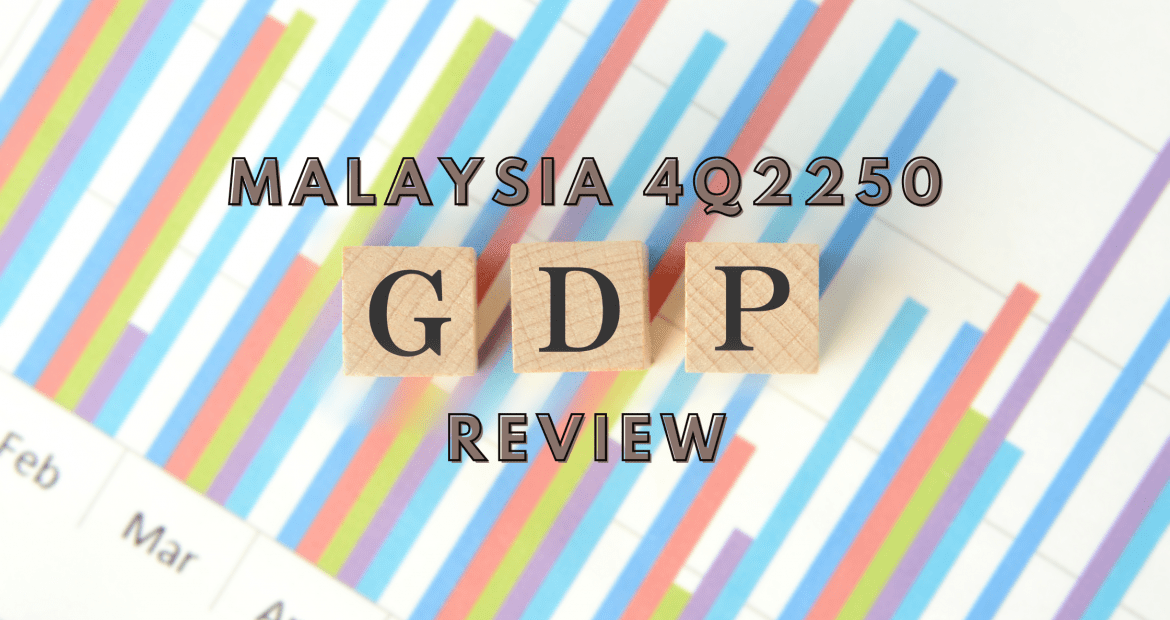- Malaysia’s 4Q22 Gross Domestic Product (GDP) was above consensus of +6.6% YoY, rising by +7.0% YoY. Full-year 2022 GDP growth was higher at +8.7% YoY, slightly above Bloomberg consensus of +8.6% YoY. The recovery in Malaysian economic growth (2021 GDP: +3.1% YoY) was supported by the low base effect of tepid 2021 growth, as well as fading pandemic effects. This allowed Malaysia to rank among the fastest GDP growers in Asia for 2022 (Indonesia: +5.3% YoY; Vietnam: +8.0% YoY; Thailand estimated: +3.4% YoY).
- Domestic private consumption along with buoyant services sector sustained GDP growth. Private consumption expenditures were still a key driver of Malaysian GDP growth, rising at +7.4% YoY (3Q22: +15.1% YoY). Despite strong consumption numbers, we note that wholesale and retail trade growth in Malaysia had moderated to +9.9% YoY in 4Q22 (3Q22: +25.9% YoY) as a result of higher base effects. Similarly, the services and manufacturing sectors were still expanding albeit at a slower pace than in 3Q22.
- Local labour market remains resilient, with broad-based improvement and stable jobs growth. Malaysia’s unemployment was stable at 3.6% as of December 2022, although it remains higher than pre-pandemic (February 2020: 3.3%). Notably, employment rose across all categories e.g. own-account workers, employees etc which illustrated a more broad-based and equal recovery instead of specific winners in selected sectors.
Opus’s opinion:
- 2023 GDP growth expected to normalize as low base effect fades and global slowdowns materialize. Malaysia’s economic growth is expected to normalise in 2023, with the Ministry of Finance forecasting 4.0% – 5.0% growth. We note that this forecast is more in line with Malaysia’s long-term average of 5.1%. Despite concerns over a global growth slowdown and a pause in the rate hike cycle, Bank Negara Malaysia (BNM) notes that Malaysia is unlikely to enter a recession. We opine that weaknesses in external factors for Malaysia (illustrated by slowing trade numbers) could be offset by China’s economic reopening and higher tourism activity.
- BNM paused rate hike cycle to assess lagging effects of monetary policy. While BNM remains sanguine on Malaysia’s economic prospects, we expect BNM to hike by 25bps at the next Monetary Policy Committee (MPC) meeting in view of the still-elevated domestic inflation outlook. However, it is important to note that the window for further rate hikes is closing rapidly as global growth slowdowns could spill over into Malaysia’s trade-reliant economy.
Disclaimer
The information, analysis and opinions expressed herein are for general information only and are not intended to provide specific advice or recommendations for any individual entity. Individual investors should contact their own licensed financial professional advisor to determine the most appropriate investment options. This material contains the opinions of the manager, based on assumptions or market conditions and such opinions are subject to change without notice. This material has been distributed for informational purposes only and should not be considered as investment advice or a recommendation of any particular security, strategy or investment product. Information provided herein may include data or opinion that has been obtained from, or is based on, sources believed to be reliable, but is not guaranteed as to the accuracy or completeness of the information. No part of this material may be reproduced in any form, or referred to in any other publication, without express written permission. Opus Asset Management Sdn Bhd and its employees accept no liability whatsoever with respect to the use of this material or its contents.




